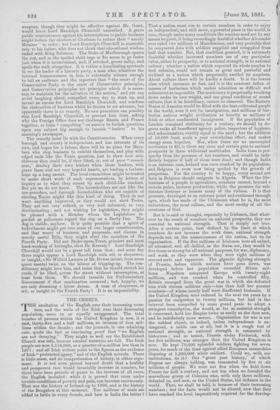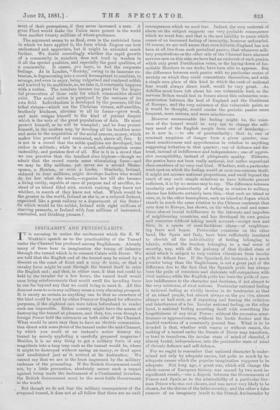THE CENSUS.
THE exultation of the English over their increasing num- bers, and the wails of the Irish over their decreasing population, seem to us equally exaggerated. The total number of persons within the United Kingdom is now, it is said, thirty-five and a half millions, an increase of four mil- lions within the decade ; and the journals, in one admiring roar, quote the fact as convincing proof that "we English are not decaying." They might as well say the Established Church was safe, because curates' nurseries are full. The Irish people are now 5,150,000, or a quarter-of-a-million less than in 1871; and all Irish writers point to the figures as the evidence of Irish" protracted agony," and of the English misrule. There is little sense, and no comprehension of history, in either argu- ment. It is not even proved beyond doubt that a healthy and prosperous race would invariably increase in number, for there have been periods of pause in the increase of all races, the English included ; while it is proved that races under terrible conditions of poverty and pain, can increase enormously. That was the history of Ireland up to 1806, and is the history of the Bengalees at this moment. Ten millions of souls are added to India in every decade, and how is India the better ?
That a nation must rise to certain numbers in order to enjoy an independent, and still more, a powerful place in the world, is true, though under many conditions the number need not by any means be great, it being exceedingly doubtful whether Alexander ever ruled two millions of Macedonians, and very probable that he conquered Asia with soldiers supplied and resupplied from half that number. But, that condition granted, it is extremely doubtful whether increased numbers are of any particular value, either to prosperity, or to national strength, or to national culture ; whether a nation which exported its whole surplus to feed colonies, would not remain as great and powerful and civilised as a nation which perpetually swelled its numbers. About culture there will be hardly a doubt. It is the lowest class which increases so fast, and it is the constant influx of masses of barbarism which makes education so difficult and refinement so impossible. The machinery is perpetually breaking down under its own weight, and one grand condition of sound culture, that it be hereditary, cannot be observed. The Eastern States of America would be filled with the beat cultivated people in the world, were it not for immigration, and millions of bar- barian natives weight civilisation as heavily as millions of Irish or other uneducated immigrants. If the population of London remained stationary for a century, we should by de- grees make all beneficent agency, police, inspectors of hygiene, and schoolmasters, exactly equal to the need ; but the addition of 50,000 fresh souls a year overwhelms effort, and makes energy seem hopeless. Nor, when there are no unoccupied territories to fill, is there any clear and certain gain to national prosperity in these additional multitudes. India loses in pro- sperity from the pressure of her numbers, and would be inde- finitely happier if half of them were dead ; and though India is an extreme case, Ireland was once crushed by its population, and Belgium is even now being spoiled by the growth of pauperism. For the country to be happy, every second son born in Belgium should emigrate to Algeria. Wheri the life- business of a people is agriculture, numbers cannot, beyond a certain point, increase production, while the pressure for sub- sistence destroys or lessens many of the virtues. It is that pressure, developed to an extreme point and continued through ages, which has made of the Chinaman what he is, the most industrious, the most callous, and the most earthy of all the creatures of God.
But it is said or thought, especially by Irishmen, that what- ever be the result of numbers on national prosperity, they are essential to national strength. That is simply not true. After a certain point, best defined by the limit at which numbers do not increase the work done, national strength depends not on the numerousness of the nation, but on its organisation. If the five millions of Irishmen were all united, all educated, and all drilled, as the Swiss are, they would be five times as strong for all national purposes, for war, diplomacy, and work, as they were when they were eight millions of starved serfs and rapparees. The gigantic fighting strength of Prussia, before which nations have gone down, was developed before her population exceeded fifteen mil- lions. Napoleon conquered Europe with twenty-eight millions, and was crushed when he controlled fifty. Britain emerged from the great war in which she defeated him with sixteen millions only—less than half her present numbers—of whom nearly half were disaffected Irishmen. If the United Kingdom were reduced in the next ten years by a passion for emigration to twenty millions, but had in the interval been compelled by some grand panic to adopt a stringent conscription, she would, as far as material strength is concerned, hold her Empire twice as easily as she does now, and be indefinitely more secure. Organisation for war is not the noblest object, or indeed, unlese independence is en- dangered, a noble one at all, but it is a rough teat of national strength, as national strength is estimated by historians ; and so tested, Prussia under Frederick, with her five millions; was stronger than the United Kingdom is now. He kept 70,000 splendid soldiers fighting for seven years, for much of the time against allied European monarchies disposing of 1,200,000 white soldiers. Could we, with our institutions, do it ? Our "great past history," of which Jingoes are always talking, was transacted by five or six millions of people. We were not five when we held down France for half a century, and not ten when we founded the marvellous group of Colonies who, with only three millions, defeated us, and now, as the United States, bid defiance to the world. That, we shall be told, is because of their increasing numbers ; but the facts would not be altered, now that they have reached the level imperatively required for the develop.
xnent of their possessions, if they never increased a man. A great Fleet would make the Union more potent in the world than another twenty millions of wheat-producers.
The argument seems to us final, even in the restricted form in which we have applied it, the form which Jingoes can best understand and appreciate, but it might be extended much further. We doubt exceedingly whether the rapid growth of a community in numbers does not tend to weaken in it all the special qualities, and especially the good qualities, of a community. It ceases, pro tanto, to feel the corporate feelings. As in London, "Society," owing to its immense ex- tension, is degenerating into a crowd incompetent td combine, to arrange, and even to enjoy, being vulgarised and rendered selfish and hurried by its multitude, so, we take it, it constantly happens with a nation. The numbers become too great for the hope- ful prosecution of those ends for which communities should exist. The social action is paralysed by the vastness of its own field. Individualism is developed by the pressure, till the tribal virtues—which are the Christian virtues, self-sacrifice, brotherly kindness, altruism in all its forms—grow weak, and man resigns himself to the kind of patient despair -which is the note of the great populations of Asia. He must protect himself, or he will be trampled ; and he does protect himself, in the modern way, by devoting all his faculties more and more to the acquisition of the social armour, money, which makes him powerful and contented, and, above all, free. It is not in a crowd that the noble qualities are developed, but rather in solitude ; while in a crowd, self-abnegation seems imbecility, and perishes first of all. Nor is it in a crowd that we can perceive that the intellect rises highest—though we admit that the crowd exerts some stimulating force—and we may be fifty millions, yet never see a second Shake-
speare, a Newton, or even a Locke. Similarly, Ireland, reduced to four millions, might develope leaders who would do for her what she needs,—organise her till she became a living entity, capable at once Of purpose and of sacrifice, in- stead of an island filled with crowds rushing they know not whither, in search of they know not what. Which would be the greater in the world, Ireland as she is, or a reduced Ireland, organised like a great railway or a department of the State ? Or which would be the nobler, Ireland with eight millions of starving peasants, or Ireland with four millions of instructed, contented, and thinking yeomen ?




















 Previous page
Previous page